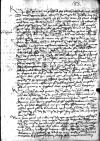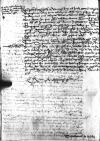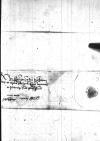De mense proxime praeterito redditae sunt Reverendissimae Paternitatis Vestrae cf. Ioannes DANTISCUS to Dietrich von RHEDEN Heilsberg (Lidzbark Warmiński), 1538-08-14, CIDTC IDL 6438, letter lost⌊litteraecf. Ioannes DANTISCUS to Dietrich von RHEDEN Heilsberg (Lidzbark Warmiński), 1538-08-14, CIDTC IDL 6438, letter lost⌋, Heilsberg (Lidzbark Warmiński, Heilsberga), town in Ermland (Warmia), the main seat of the bishops of Ermland⌊HeylsbergHeilsberg (Lidzbark Warmiński, Heilsberga), town in Ermland (Warmia), the main seat of the bishops of Ermland⌋ 1538-08-14⌊XIIII Augusti1538-08-14⌋ scriptae, profecto iucundissimae, quod his tandem certior sim factus cf. Dietrich von RHEDEN to Ioannes DANTISCUS Rome, 1538-04-23, CIDTC IDL 4571⌊litterascf. Dietrich von RHEDEN to Ioannes DANTISCUS Rome, 1538-04-23, CIDTC IDL 4571⌋ meas una cum bullis (uti vocant) apostolicis confirmationis etc. redditas et perlatas fuisse. Quaenam ut tam tarde perferentur, fuerit occasio, prorsus ignosco, cum omnino sperabam cf. Dietrich von RHEDEN to Ioannes DANTISCUS Rome, 1538-04-23, CIDTC IDL 4571⌊illascf. Dietrich von RHEDEN to Ioannes DANTISCUS Rome, 1538-04-23, CIDTC IDL 4571⌋ per totum mensem Maium ad Reverendissimam Paternitatem Vestram perlatum iri. Utcumque sit, gaudeo ex animo tandem perlatas redditasque fuisse.
Quod autem cum reverendissimo domino, immo domino meo colendissimo [] domino Culmensi on the margin⌈ hidden by binding⌈[] hidden by binding⌉ Tiedemann Giese (Tidemannus Gisius) (*1480 – †1550), in 1519 ennobled by King Sigismund I; 1504-1538 Canon of Ermland (Warmia); 1516-1527, 1533-1537 Judicial Vicar and Vicar General of Ermland; 1523-1538 Custos of Ermland; 1537-1549 Bishop of Kulm (Chełmno); 1549-1550 Bishop of Ermland (BORAWSKA 1984, passim)⌊domino CulmensiTiedemann Giese (Tidemannus Gisius) (*1480 – †1550), in 1519 ennobled by King Sigismund I; 1504-1538 Canon of Ermland (Warmia); 1516-1527, 1533-1537 Judicial Vicar and Vicar General of Ermland; 1523-1538 Custos of Ermland; 1537-1549 Bishop of Kulm (Chełmno); 1549-1550 Bishop of Ermland (BORAWSKA 1984, passim)⌋[] domino Culmensi on the margin⌉ praeter fas aequumque actum sit, revera non ignoro. Ego, quantum per me licuit, omnem adhibui operam et diligentiam (testis est Ioannes Magnus (Ioannes Store, Jöns Månsson, Ioannes Magni) (*1488 – †1544), doctor of theology, diplomat in the service of Pope Adrian VI and Gustav Vasa, King of Sweden. In the years 1526-1531 he was staying in Gdańsk as a royal envoy. After his banishment from Sweden by Protestants, he remained in this city until 1537; in this year he went to Italy, where he took part in the Council of Mantua; 1506 Canon of Linköping and Skara, 1523 Papal Nuncio to the new King of Sweden Gustav Vasa; in the same year Provost of the Strängnäs Chapter and Bishop of Västerås, 1523-1544 Archbishop of Uppsala (consecrated by the Pope in 1533) (MAGNUS 1992, p. 9-11; CE, vol. 2, p. 368)⌊reverendissimus dominus UpsalensisIoannes Magnus (Ioannes Store, Jöns Månsson, Ioannes Magni) (*1488 – †1544), doctor of theology, diplomat in the service of Pope Adrian VI and Gustav Vasa, King of Sweden. In the years 1526-1531 he was staying in Gdańsk as a royal envoy. After his banishment from Sweden by Protestants, he remained in this city until 1537; in this year he went to Italy, where he took part in the Council of Mantua; 1506 Canon of Linköping and Skara, 1523 Papal Nuncio to the new King of Sweden Gustav Vasa; in the same year Provost of the Strängnäs Chapter and Bishop of Västerås, 1523-1544 Archbishop of Uppsala (consecrated by the Pope in 1533) (MAGNUS 1992, p. 9-11; CE, vol. 2, p. 368)⌋), ne iniuria afficeretur. Attamen nihil profeci, igitur patienter, quae emendari hac scilicet vice non possunt, ferenda sunt. Deus Omnipotens mihi testis est, quod iniuriam Tiedemann Giese (Tidemannus Gisius) (*1480 – †1550), in 1519 ennobled by King Sigismund I; 1504-1538 Canon of Ermland (Warmia); 1516-1527, 1533-1537 Judicial Vicar and Vicar General of Ermland; 1523-1538 Custos of Ermland; 1537-1549 Bishop of Kulm (Chełmno); 1549-1550 Bishop of Ermland (BORAWSKA 1984, passim)⌊ipsiusTiedemann Giese (Tidemannus Gisius) (*1480 – †1550), in 1519 ennobled by King Sigismund I; 1504-1538 Canon of Ermland (Warmia); 1516-1527, 1533-1537 Judicial Vicar and Vicar General of Ermland; 1523-1538 Custos of Ermland; 1537-1549 Bishop of Kulm (Chełmno); 1549-1550 Bishop of Ermland (BORAWSKA 1984, passim)⌋ ac iacturam, qua affectus fuit, aeque ac reverendissima paternitas sua dolenter tuli. Quod autem dominus Georg Hegel (†1547), the Thurzons' and later the Fuggers' factor in Cracow (worked for the Fuggers at least from 1521); supplier to the royal court in Cracow (PSB 9, p. 336)⌊Georgius HegellGeorg Hegel (†1547), the Thurzons' and later the Fuggers' factor in Cracow (worked for the Fuggers at least from 1521); supplier to the royal court in Cracow (PSB 9, p. 336)⌋, The Fuggers German family of merchants and bankers that dominated European business during the 15th and 16th centuries⌊FuggarorumThe Fuggers German family of merchants and bankers that dominated European business during the 15th and 16th centuries⌋ Cracow (Kraków, Cracovia), city in southern Poland, Małopolska, on the Vistula river, from 1038 capital of the Kingdom of Poland⌊CracoviaeCracow (Kraków, Cracovia), city in southern Poland, Małopolska, on the Vistula river, from 1038 capital of the Kingdom of Poland⌋ institor etc., 400 illos ducatos, quos in praedicta Tiedemann Giese (Tidemannus Gisius) (*1480 – †1550), in 1519 ennobled by King Sigismund I; 1504-1538 Canon of Ermland (Warmia); 1516-1527, 1533-1537 Judicial Vicar and Vicar General of Ermland; 1523-1538 Custos of Ermland; 1537-1549 Bishop of Kulm (Chełmno); 1549-1550 Bishop of Ermland (BORAWSKA 1984, passim)⌊reverendissimi CulmensisTiedemann Giese (Tidemannus Gisius) (*1480 – †1550), in 1519 ennobled by King Sigismund I; 1504-1538 Canon of Ermland (Warmia); 1516-1527, 1533-1537 Judicial Vicar and Vicar General of Ermland; 1523-1538 Custos of Ermland; 1537-1549 Bishop of Kulm (Chełmno); 1549-1550 Bishop of Ermland (BORAWSKA 1984, passim)⌋ expeditione de pecuniis pi(ae) me(moriae) heredum Mauritius Ferber (*1471 – †1537), doctor of both canon and civil law; from 1507 Canon of Ermland (Warmia) and Lübeck; from 1514 Canon of Trier; 1512-1515 parish priest of the Church of Saints Peter and Paul in Gdańsk (Danzig); from 1516 Custos of Ermland and parish priest of the Church of the Blessed Virgin Mary in Gdańsk; from 1519 Canon of Dorpat; from 1523 Canon of Revel; 1523-1537 Bishop of Ermland (KOPICZKO 2, p. 71-72; SBKW, p. 59-60)⌊episcopi WarmiensisMauritius Ferber (*1471 – †1537), doctor of both canon and civil law; from 1507 Canon of Ermland (Warmia) and Lübeck; from 1514 Canon of Trier; 1512-1515 parish priest of the Church of Saints Peter and Paul in Gdańsk (Danzig); from 1516 Custos of Ermland and parish priest of the Church of the Blessed Virgin Mary in Gdańsk; from 1519 Canon of Dorpat; from 1523 Canon of Revel; 1523-1537 Bishop of Ermland (KOPICZKO 2, p. 71-72; SBKW, p. 59-60)⌋ solvi, repetere conatur, praeter aequum facit. Nam, uti meum dictat chirographum ms. cyroglaphum(!)
⌈chirographumchirographum ms. cyroglaphum(!)
⌉, ad dictam Tiedemann Giese (Tidemannus Gisius) (*1480 – †1550), in 1519 ennobled by King Sigismund I; 1504-1538 Canon of Ermland (Warmia); 1516-1527, 1533-1537 Judicial Vicar and Vicar General of Ermland; 1523-1538 Custos of Ermland; 1537-1549 Bishop of Kulm (Chełmno); 1549-1550 Bishop of Ermland (BORAWSKA 1984, passim)⌊reverendissimi CulmensisTiedemann Giese (Tidemannus Gisius) (*1480 – †1550), in 1519 ennobled by King Sigismund I; 1504-1538 Canon of Ermland (Warmia); 1516-1527, 1533-1537 Judicial Vicar and Vicar General of Ermland; 1523-1538 Custos of Ermland; 1537-1549 Bishop of Kulm (Chełmno); 1549-1550 Bishop of Ermland (BORAWSKA 1984, passim)⌋ expeditionem habui dumtaxat a The Fuggers German family of merchants and bankers that dominated European business during the 15th and 16th centuries⌊FuggarisThe Fuggers German family of merchants and bankers that dominated European business during the 15th and 16th centuries⌋ sive illorum in Rome (Roma), city in central Italy, on the Tiber river, seat of the Holy See⌊urbeRome (Roma), city in central Italy, on the Tiber river, seat of the Holy See⌋ agente, videlicet domino Quirinus Galler (†1543), a merchant from Passau and the Fuggers' agent in Rome; scribe of the Roman Rota and notary of the Roman Curia (RC, No. 443, 479, 485; NOVA 1981, p. 355-372 )⌊Quirino GallerQuirinus Galler (†1543), a merchant from Passau and the Fuggers' agent in Rome; scribe of the Roman Rota and notary of the Roman Curia (RC, No. 443, 479, 485; NOVA 1981, p. 355-372 )⌋, ducatos de camera 862 Iulos 3,5, reliquos 400 ducatos dedi et posui ad dictam expeditionem ex pecuniis praefatorum heredum. Et me ad quitantias sive chirographa ms. cyrographa(!)
⌈chirographachirographa ms. cyrographa(!)
⌉ mea refero, quae si exhibita fuerint, facile constabit, quid et quantum a The Fuggers German family of merchants and bankers that dominated European business during the 15th and 16th centuries⌊FuggarisThe Fuggers German family of merchants and bankers that dominated European business during the 15th and 16th centuries⌋ dictae expeditionis nomine receperim.
Reverendissimo domino Antonio Pucci (*1484 – †1544), 1517-1521 papal nuncio in Switzerland; 1518-1541 Bishop of Pistoia; 1529-1541 Bishop of Vannes; 1529-1544 Penitentiary Major; 1531-1541 Cardinal of SS. IV Coronati; 1541-1542 Cardinal of Santa Maria in Trastevere; 1542-1543 Bishop of Albano; 1543-1544 Bishop of Sabina; 1532-1544 Cardinal Protector of the Kingdom of Poland and Portugal (WOJTYSKA 1977, p. 243; CE, p. 122-123)⌊cardinali Sanctorum QuattuorAntonio Pucci (*1484 – †1544), 1517-1521 papal nuncio in Switzerland; 1518-1541 Bishop of Pistoia; 1529-1541 Bishop of Vannes; 1529-1544 Penitentiary Major; 1531-1541 Cardinal of SS. IV Coronati; 1541-1542 Cardinal of Santa Maria in Trastevere; 1542-1543 Bishop of Albano; 1543-1544 Bishop of Sabina; 1532-1544 Cardinal Protector of the Kingdom of Poland and Portugal (WOJTYSKA 1977, p. 243; CE, p. 122-123)⌋ Reverendissimae Paternitatis Vestrae cf. Ioannes DANTISCUS to Antonio PUCCI ca. 1538-08-14, CIDTC IDL 7255, letter lost⌊litterascf. Ioannes DANTISCUS to Antonio PUCCI ca. 1538-08-14, CIDTC IDL 7255, letter lost⌋ reddidi ac litteras illas apostolicas Reverendissimae Paternitatis Vestrae quoad Kulm diocese (Chełmno diocese)⌊ecclesiam CulmensemKulm diocese (Chełmno diocese)⌋ confirmationis. Quibus luce clarius constabat dictae confirmationis Culmensis negotium non Bologna (Bononia), city in Italy at the southern end of the plain of the Po valley, between 1506 and 1860 it belonged to the Papal State⌊BononiaeBologna (Bononia), city in Italy at the southern end of the plain of the Po valley, between 1506 and 1860 it belonged to the Papal State⌋, immo Rome (Roma), city in central Italy, on the Tiber river, seat of the Holy See⌊RomaeRome (Roma), city in central Italy, on the Tiber river, seat of the Holy See⌋ expeditas fuisse exhibui. Arbitror enim(?) Reverendissimam Paternitatem Vestram, qui illas scripserit, et me, qui easdem praesentaverim, illarum occasione parum gratiae et benevolentiae apud eandem suam Antonio Pucci (*1484 – †1544), 1517-1521 papal nuncio in Switzerland; 1518-1541 Bishop of Pistoia; 1529-1541 Bishop of Vannes; 1529-1544 Penitentiary Major; 1531-1541 Cardinal of SS. IV Coronati; 1541-1542 Cardinal of Santa Maria in Trastevere; 1542-1543 Bishop of Albano; 1543-1544 Bishop of Sabina; 1532-1544 Cardinal Protector of the Kingdom of Poland and Portugal (WOJTYSKA 1977, p. 243; CE, p. 122-123)⌊reverendissimam paternitatemAntonio Pucci (*1484 – †1544), 1517-1521 papal nuncio in Switzerland; 1518-1541 Bishop of Pistoia; 1529-1541 Bishop of Vannes; 1529-1544 Penitentiary Major; 1531-1541 Cardinal of SS. IV Coronati; 1541-1542 Cardinal of Santa Maria in Trastevere; 1542-1543 Bishop of Albano; 1543-1544 Bishop of Sabina; 1532-1544 Cardinal Protector of the Kingdom of Poland and Portugal (WOJTYSKA 1977, p. 243; CE, p. 122-123)⌋ contraxisse. Utcumque sit, uti Reverendissima Paternitas Vestra iussit, feci. Ferat Antonio Pucci (*1484 – †1544), 1517-1521 papal nuncio in Switzerland; 1518-1541 Bishop of Pistoia; 1529-1541 Bishop of Vannes; 1529-1544 Penitentiary Major; 1531-1541 Cardinal of SS. IV Coronati; 1541-1542 Cardinal of Santa Maria in Trastevere; 1542-1543 Bishop of Albano; 1543-1544 Bishop of Sabina; 1532-1544 Cardinal Protector of the Kingdom of Poland and Portugal (WOJTYSKA 1977, p. 243; CE, p. 122-123)⌊illeAntonio Pucci (*1484 – †1544), 1517-1521 papal nuncio in Switzerland; 1518-1541 Bishop of Pistoia; 1529-1541 Bishop of Vannes; 1529-1544 Penitentiary Major; 1531-1541 Cardinal of SS. IV Coronati; 1541-1542 Cardinal of Santa Maria in Trastevere; 1542-1543 Bishop of Albano; 1543-1544 Bishop of Sabina; 1532-1544 Cardinal Protector of the Kingdom of Poland and Portugal (WOJTYSKA 1977, p. 243; CE, p. 122-123)⌋ ac interpraetetur, ut velit.
Nova ferme penes nos nulla, nisi quod ager Solfatara di Pozzuoli⌊PuteolanusSolfatara di Pozzuoli⌋, uti olim Mount Vesuvius⌊VesuviusMount Vesuvius⌋ prope Naples (Napoli, Neapolis), city in Italy, on the coast of the Tyrrhenian Sea, capital of the region of Campania⌊NeapolimNaples (Napoli, Neapolis), city in Italy, on the coast of the Tyrrhenian Sea, capital of the region of Campania⌋ cum magno vicinorum dispendio conflagravit, uti Reverendissima Paternitas Vestra ex adiunctis schedis typo excussis latius intelliget, licet iam ad aliquot dies ardere desiit. Praemissa tamen Reverendissimam Paternitatem Vestram iamdudum intellexisse arbitror. Et dum praemissa 29 Septembris contingerent, fui Pozzuoli (Puteoli)⌊PuteoliPozzuoli (Puteoli)⌋ per biduum 22 et 23 eiusdem 7-bris, invitatus Neapolim a Fuggarorum
institor(ibus) or institor(e)⌈institor(ibus)institor(ibus) or institor(e)⌉
, sensique ibidem magnum terrae motum.
 AAWO, AB, D.68, f. 193v
AAWO, AB, D.68, f. 193v
Classis pontificia orig. pontificea⌈pontificiapontificia orig. pontificea⌉, Charles V of Habsburg (*1500 – †1558), ruler of the Burgundian territories (1506-1555), King of Spain as Charles I (1516-1556), King of Naples and Sicily, King of the Romans (1519-1530), Holy Roman Emperor of the German Nation (elected 1519, crowned 1530, abdicated 1556); son of Philip I the Handsome and Joanna the Mad of Castile⌊caesarisCharles V of Habsburg (*1500 – †1558), ruler of the Burgundian territories (1506-1555), King of Spain as Charles I (1516-1556), King of Naples and Sicily, King of the Romans (1519-1530), Holy Roman Emperor of the German Nation (elected 1519, crowned 1530, abdicated 1556); son of Philip I the Handsome and Joanna the Mad of Castile⌋ et Citizens of the Republic of Venice ⌊VenetorumCitizens of the Republic of Venice ⌋ iam ad Italy (Italia)⌊ItaliaeItaly (Italia)⌋ portus rediisse dicitur hidden by binding⌈[citur]citur hidden by binding⌉. Alii referunt eandem adhuc in Dalmatiae portibus Venetis subiectis esse on the margin⌈Alii referunt eandem adhuc in Dalmatia⌊DalmatiaeDalmatia⌋ portibus Citizens of the Republic of Venice ⌊VenetisCitizens of the Republic of Venice ⌋ subiectis esseAlii referunt eandem adhuc in Dalmatiae portibus Venetis subiectis esse on the margin⌉[1], expugnata tamen ante reditum in Dalmatia⌊DalmatiaDalmatia⌋ supra Ragusa (Dubrovnik, Rhagusium), city and maritime republic in Dalmatia, on the Adriatic Sea⌊Raghusium hidden by binding⌈[sium]sium hidden by binding⌉Ragusa (Dubrovnik, Rhagusium), city and maritime republic in Dalmatia, on the Adriatic Sea⌋ quadam arce ante aliquot annos a The Ottoman Turks (Turcae) ⌊TurcisThe Ottoman Turks (Turcae) ⌋ ibidem constructa, Castellum Novum⌊Castello hidden by binding⌈[stello]stello hidden by binding⌉ NovoCastellum Novum⌋ dicta. In qua satis validum, dicunt, The Ottoman Turks (Turcae) ⌊TurcarumThe Ottoman Turks (Turcae) ⌋ fuisse praesidium hidden by binding⌈[sidium]sidium hidden by binding⌉. Qui omnes ad interemp ms. im(!)
⌈empemp ms. im(!)
⌉tionem caesi dicuntur. Praeterea a Corsica, island in the Mediterranean Sea⌊CursicaCorsica, island in the Mediterranean Sea⌋ tempestate passa est naufragium, in quo ultra 30 triremes hidden by binding⌈[es]es hidden by binding⌉ periisse dicuntur praeter eas, quae conquassatae inutilesque sunt, redditae hidden by binding⌈[ae]ae hidden by binding⌉ asseruntur. Utrimque pro futuro vere armatur instruiturque validissima hidden by binding⌈[ima]ima hidden by binding⌉ classis. Deus Omnipotens nobis ac nostris propitius adsit.
Charles V of Habsburg (*1500 – †1558), ruler of the Burgundian territories (1506-1555), King of Spain as Charles I (1516-1556), King of Naples and Sicily, King of the Romans (1519-1530), Holy Roman Emperor of the German Nation (elected 1519, crowned 1530, abdicated 1556); son of Philip I the Handsome and Joanna the Mad of Castile⌊CaesaremCharles V of Habsburg (*1500 – †1558), ruler of the Burgundian territories (1506-1555), King of Spain as Charles I (1516-1556), King of Naples and Sicily, King of the Romans (1519-1530), Holy Roman Emperor of the German Nation (elected 1519, crowned 1530, abdicated 1556); son of Philip I the Handsome and Joanna the Mad of Castile⌋ in Martio vel Aprili in Italy (Italia)⌊ItaliamItaly (Italia)⌋ venturum esse constans est hidden by binding⌈[est]est hidden by binding⌉ fama. De concilio continuando certo fertur Paul III (Alessandro Farnese) (*1468 – †1549), 1493 elevated to cardinal; 1524 Cardinal-Bishop of Ostia; 1534-1549 Pope⌊pontificemPaul III (Alessandro Farnese) (*1468 – †1549), 1493 elevated to cardinal; 1524 Cardinal-Bishop of Ostia; 1534-1549 Pope⌋ Vicenza (Vincentia), city in northeastern Italy, Veneto, 60 km E of Venice⌊Vincentiam hidden by binding⌈[tiam]tiam hidden by binding⌉Vicenza (Vincentia), city in northeastern Italy, Veneto, 60 km E of Venice⌋ aut in Lumbardiam on the margin⌈aut in Lombardy, region in northern Italy⌊LumbardiamLombardy, region in northern Italy⌋aut in Lumbardiam on the margin⌉[2] iturum. Quicquid tamen circa praemissa fiet, curabo sedulo, ne Reverendissimam Paternitatem Vestram lateat, et quidem tempestive.
Et me Reverendissimae Paternitati Vestrae uti devotissimum hidden by binding⌈[imum]imum hidden by binding⌉ mancipium plurimum commendo. Decreveram in aestate proxime praeterita hidden by binding⌈[erita]erita hidden by binding⌉ Germany (Germania, Niemcy)⌊GermaniamGermany (Germania, Niemcy)⌋ versus proficisci, attamen a nonnullis sum interpellatus princip hidden by binding⌈[rincip]rincip hidden by binding⌉ibus, quibus iure negare nil poteram, ut omnino mihi ad principium hidden by binding⌈[ium]ium hidden by binding⌉ futuri veris hic manendum erit, ac demum quod nuper mecum statui hidden by binding⌈[tui]tui hidden by binding⌉, tandem Deo dante et auxiliante opere exsequar et perficiam, ta coram Reverendissimam Paternitatem Vestram invisam.
 AAWO, AB, D.68, f. [1v] missed in numbering after 193
AAWO, AB, D.68, f. [1v] missed in numbering after 193


